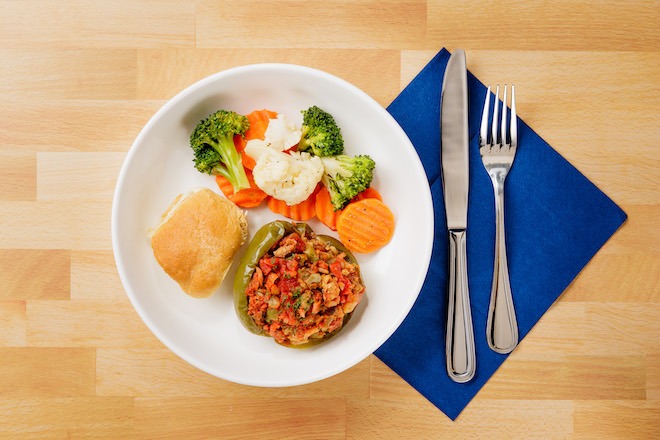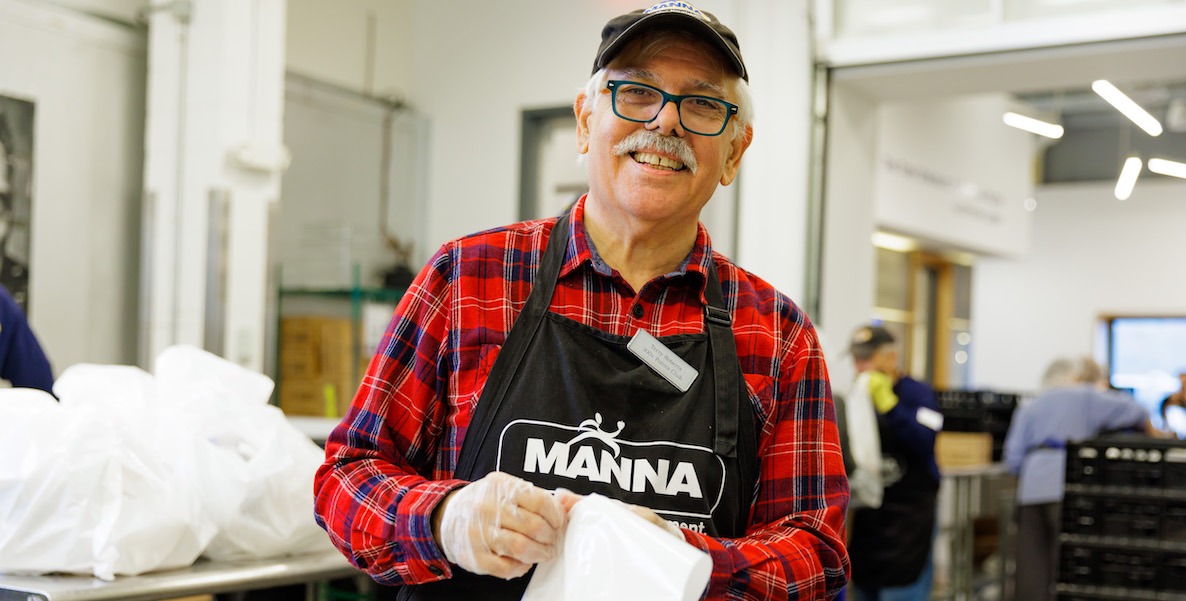You could call Kevin Kilmartin a bit of a foodie. Now 68, he fondly remembers wowing celebrity chefs Masahuru Morimoto and Gordon Ramsay when he entered his wasabi-dusted, sesame-crusted ahi tuna and papaya salad in a local food competition in 2017. “Morimoto tasted my dish and said he’d work for me any time,” Kilmartin says with a chuckle one December morning from his South Philly home.
But a stroke in 2018 and kidney issues left Kilmartin, who formerly oversaw maintenance for three City buildings, unable to cook for himself or his wife. “My kidneys shut down on me last October, and I just didn’t have the energy to cook,” he says.
Doctors said for Kilmartin to qualify for a kidney transplant, he’d have to lose 100 pounds, and obey a strict diet, one with hard-to-understand restrictions about components like phosphates and phosphorus. Too drained to cook, too overwhelmed by the cost of relying exclusively on takeout, and feeling guilty about burdening his worried wife, he turned to MANNA, the 35-year-old nonprofit that provides free, medically-tailored meals (MTMs) and education about how nutrition affects health conditions to Philadelphians who need it.
His father-in-law had relied on MANNA when Kilmartin and his wife had cared for him, and Kilmartin remembered the service positively. So he reached out and worked with a MANNA nutritionist who devised a weekly meal plan for him, including 21 medically-tailored meals — like beef tips (his favorite) and breakfast burritos (a menu staple) — along with a companion menu for his wife.
Now, Kilmartin says, “my labs are coming back beautiful, I’m right on-target.” He’s lost 67 pounds; his wife has lost 100. “Last year at this time, I could barely walk 100 feet,” he says. “Now, I walk more than 2 miles, several times a week, from my dialysis center back home.”
A nationwide program of MTMs for patients with certain conditions and limitations could potentially avert “1.6 million hospitalizations and save insurers $13.6 billion annually.” — MANNA CEO Sue Daugherty
MANNA’s positive impact is more than anecdotal. Last month, the journal BMC Nutrition released research by The MANNA Institute, the research arm of MANNA, showing that its clients achieved a “significant decrease in malnutrition risk” and meaningful changes in conditions like diabetes and hypertension. ”This is the first of its kind,” explains Jule Anne Henstenburg, PhD, director of The MANNA Institute. “There has never been research involving an in-depth evaluation of a functioning medically tailored meal program.”
Among other compelling findings: Of the clients at risk for malnutrition when starting the program, 56 percent experienced a clinically significant reduction in malnutrition risk by program finish; 62 percent of clients with hypertension reduced their blood pressure by five or more units; among clients with diabetes, median hemoglobin A1C dropped from 8.3 percent to 7.7 percent, indicating improved blood sugar control. Body mass index (BMI) remained stable or decreased for 88 percent of clients who started the program with obesity.

A health benefit for all
The study was conducted with the Food Is Medicine Coalition (FIMC), a national coalition of nonprofit organizations that provide medically tailored meals and groceries, medical nutrition therapy, nutrition counseling and education to serve people with serious illness. Specifically, the new study looked at subsets of 1,959 clients who received MANNA’s MTM services for at least two months between 2020 and 2022.
Sue Daugherty, chief executive officer of MANNA, has worked at the organization since 1999. A registered dietitian, she has always believed in the impact of MANNA — but hopes data like this might pave the way for meaningful policy and payment changes.
“Our goal is for MTMs to be a mandated covered benefit for all,” she says. “When you get prescribed medication by your doctor, it’s covered. But right now only a very small population of insurance companies will cover it,” she says. This, despite the fact that, as a JAMA article reported in 2022, a nationwide program of MTMs for patients with certain conditions and limitations could potentially avert “1.6 million hospitalizations and save insurers $13.6 billion annually.”
MANNA meals are completely free to clients. To cover their costs, the organization’s funding comes largely from philanthropy — 65 percent of its budget comes from corporate foundations, individual giving, special events and fundraising. The other 35 percent comes through fee-for-service reimbursement. MANNA contracts with participating Medicaid, Medicare Advantage and Community HealthChoices plans in Pennsylvania and New Jersey, like Aetna Better Health, AmeriHealth Caritas of Pennsylvania, AmeriHealth New Jersey, Independence Blue Cross, Jefferson Health Plans (formerly Health Partners Plans), Keystone First, Pennsylvania Health & Wellness and United Healthcare. That sounds like a laundry list — but the key word is participating — not all plans do.
“Imagine getting a prescription for your high blood pressure medicine and not having a pharmacy to fill it — that’s what happens every day when folks are discharged with complex diets.” — MANNA CEO Sue Daugherty
Clients can be referred to MANNA either by their medical care provider or through their health insurance plan. Once MANNA receives a referral, its dietitians determine if they are eligible to receive services through MANNA’s philanthropic program or if they are a member of a participating health insurance company.
The majority of MANNA’s clients are low-income, a population that often lives in food deserts, where healthy food is already hard to come by, and health literacy (the kind of insight needed to understand medically complex diets) can be low.
“I see MANNA as the pharmacy for your prescription diet,” Daugherty says. “Imagine getting a prescription for your high blood pressure medicine and not having a pharmacy to fill it — that’s what happens every day when folks are discharged with complex diets.” The top five illnesses MANNA serves are heart disease, cancer, diabetes, HIV / AIDS and congestive heart failure. Originally created in 1990 to provide comfort foods to patients with AIDS, MANNA overhauled its menu and began expanding its reach to anyone with a life-threatening illness 10 years later.
Separate from the policy implications of the study, Daughtery is hopeful that the study will emphasize the difference between for-profit meal-prep companies claiming they’re offering MTMs, and those like MANNA, that are legitimately medically-tailored. A July 2024 article in STAT News found that Medicaid was paying millions of dollars to cover the cost of a meal provider that claimed to offer medically tailored meals — when the nutrition breakdown was actually worse than that of fast food. “Our study supports that we are an evidence-based program, and that accredited programs are the ones that have defined quality standards.”
As for Kilmartin, since becoming a client of MANNA, he’s also become a volunteer, both behind the scenes at the prep kitchen and in delivering meals. His daughter, too, has joined the MANNA family, working for the organization in event-planning. Now, Kilmartin just wants others to get the support MANNA can provide.
“It takes the worry off you, it takes the worry off your shoulders and your care partner’s shoulders,” he says, breaking down in tears. “[My wife] barely sleeps when she’s worried about me — so the more worry I can take off her shoulders, the better. I know I wouldn’t have made it these last few months without MANNA.”
![]() MORE ON BETTER HEALTHCARE FROM THE CITIZEN
MORE ON BETTER HEALTHCARE FROM THE CITIZEN



